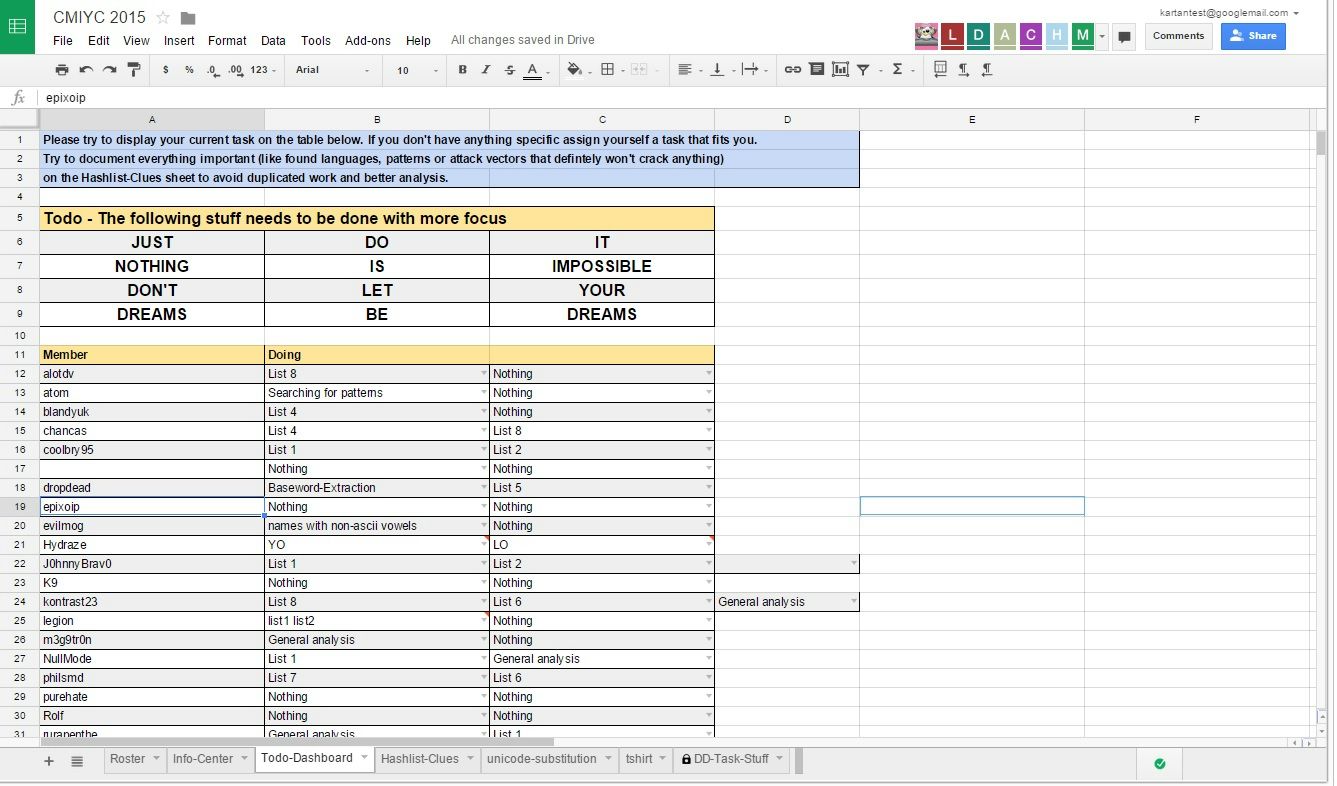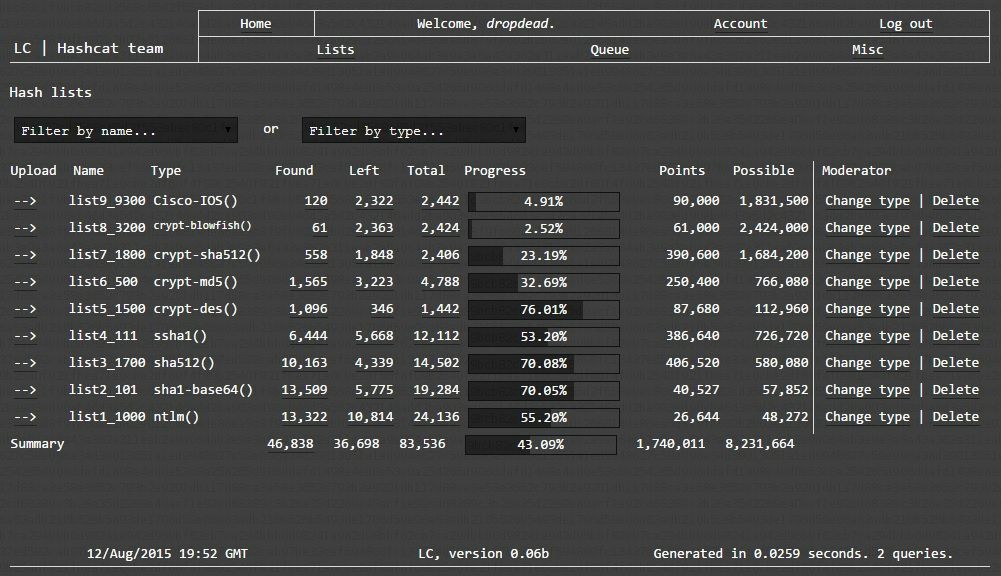Back to:
Top Teams
hashcat
Link to original writeup (external, pdf)
Resources
| Active Members
| 24
|
| Handles
| alotdv, J0hnnyBrav0, Szul, atom, K9, tehnlulz, blandyuk,
kontrast, The_Mechanic, chancas, legion, T0XlC, coolbry95,
m3g9tr0n, undeath, dropdead, NullMode, unix-ninja, EvilMog,
philsmd, Xanadrel, Hydraze, RuraPenthe, xmisery
|
| Software
| hashcat suite, List Condense (Hash Management team software)
|
| Hardware
| Roughly 75 GPUs and roughly 30 multi-core CPUs.
|

Team Hashcat: Write-up CMIYC 2015
Preparation
Team Members
Spreadsheet for Information Sharing and Coordination
Google Drive - Our Temporary Information Storage
List Condense
Contest Antics
The Hash Cracking Itself
Patterns Found
Korean Hangul Alphabet (bieup, chieut, digeut, giyok, hieut, ieung, )
Japanese ぱす (means pass and then replaced substrings pass)
German words (umlauts only)
Arabic numbering (written form)
Insert of multibyte char into English plain
Thoughts and Feedback
Team Hashcat would like to congratulate every team that participated in CMIYC 2015. We were
also intrigued to see how CynoSure has matured into a real "PRO" team. The "Street" class
competitors were also very active and following them was exciting. It appears that the contest is
getting more and more attention, thanks to KoreLogic's effort, as well as increasing global
trends and awareness of password and password-related matters.
KoreLogic's message to us was that we needed multibyte support in Hashcat. We understood
that and, as the tool's developers, we will look into how this can be accomplished whilst still
maintaining performance. Implementing a rule engine that is capable of supporting multibyte
characters for slow hashes is not a problem and we foresee it being added in the future.
We hope to see everyone again for CMIYC 2016!
Preparation
To mitigate the challenging task of information sharing and collaboration we used our own
home grown tool; list condense (which we have mentioned in previous contests), multiple IRC
channels, a Teamspeak Server and Google Drive.
To enhance team collaboration we decided to try a different approach than we had in previous
contests. The management of subgroups has shown to have a certain overhead and has proven
to not be as efficient as we had thought. We opened up the SCRUM approach and let everyone
decide on their own what to do and to just give outlines in which scope certain tasks should be.
To achieve that, we opted for a Google spreadsheet (as shown below) and assign a team
manager to update the available tasks. Furthermore, members updated their findings and
impressions on a second sheet to minimize redundancy.
We dropped the idea of our previous organizational groups and decided that every team
member should work on all hash lists. The reason is that, typically, during CMIYC contests, the
plaintext patterns were shared across all of the hash lists. This means they are not unique per
hash list as you would find them in the Positive Hack Days (PHD) contest. Therefore it made
sense not to create specific groups where specific team members are assigned to crack specific
hash lists.
Team Members
| alotdv
| J0hnnyBrav0
| Szul
|
| atom
| K9
| tehnlulz
|
| blandyuk
| kontrast
| The_Mechanic
|
| chancas
| legion
| T0XlC
|
| coolbry95
| m3g9tr0n
| undeath
|
| dropdead
| NullMode
| unix-ninja
|
| EvilMog
| philsmd
| Xanadrel
|
| Hydraze
| RuraPenthe
| xmisery
|
Spreadsheet for Information Sharing and Coordination

Google Drive - Our Temporary Information Storage

List Condense

Contest Antics
This time the hash list was not overloaded with tons of different algorithms, which was
refreshing because it brought back the original spirit of a hash cracking contest: Pattern
detection and finding out how to use tools to produce matching plains. We were able to
concentrate on the cracking part itself and not spend significant periods of time finding out which
hashing algorithms were used, converting them into a format that hashcat could use, or adding
them to our management system. Many thanks for that!
The Hash Cracking Itself
The biggest problem facing the competitors was how to work around the many variations of
Unicode characters found during the competition. One of the techniques used that proved to be
successful was to insert multi- byte characters into an ASCII plaintext string via hashcat using
the tmesis.pl tool from hashcat-utils. Once a charset and a base dictionary could be identified
we generated the rules with tmesis.pl run them with hashcat.
Tmesis.pl reads a word line by line from a file and splits the word into bytes. Tmesis.pl creates
rules that effectively insert this word into a plaintext password candidate using hashcat's
rule engine (like the rule in John The Ripper but does not append it). Tmesis.pl does not handle
multibyte unicode characters as single characters but handles them as individual bytes. This
technique is typically used to insert whole words into password candidates, but worked to insert
multibyte characters into passwords well.
Another efficient cracking method was using the increase/decrease rules supported by hashcat
and oclHashcat. UTF 8 follows some logic in its character ordering, similar to the ASCII
character set. This functionality is useful because it allows you to generate words that do not
currently exist in a wordlist. For example, a wordlist may contain the word
"password45" but not "password46". By using this functionality within the rule engine, it is possible to generate the
missing candidate because the character follows the character in the ASCII table. After
doing this, it was possible to identify that KoreLogic had inserted randomly selected UTF-8
characters into random places in the given passwords. That together means we can assume the
byte wise increment or decrement of any random position of a to generated plain, even if it a UTF-8
character, which is likely to crack something successfully. For slow hashes, this
technique generates too many candidates for it to be a viable attack vector. However, this
technique was effective at cracking the fast hashes. It was helpful in discovering which UTF-8
characters were used to generate the passwords and also helped in the identification of other
patterns that existed within the hashes.
Patterns Found
Korean Hangul Alphabet (bieup, chieut, digeut, giyok, hieut, ieung, )
To make use of this pattern we used combinator.bin and combinator3.bin from hashcat-utils.
This is like a Brute Force attack since it combines all variations of the alphabet with all of them again and again. Of
course this technique only worked for the fast hashes. We create 3 wordlists, were each wordlist was of the
size of the alphabet ^ N to have a good base for the
a 1 combinator attack-mode in oclHashcat itself. After
that we used those wordlists for the attack, for example length 3 plus length 1 to crack 4
length words of that
alphabet. For the slow hashes we simply used plain dictionary attack up to length 3.
Japanese ぱす (means pass and then replaced substrings pass)
Base words: rockyou. There is no way to replace whole substrings with whole substrings in the rule engine.
But since we tried to crack slow hashes only with this pattern, it was enough to simply sed our wordlists.
German words (umlauts only)
These were kinda hard because there are so many different German dictionaries floating around the net and
it was not easy to find the one which KoreLogic was using. Also, some of them were encoded using
ISO-8859-1, so we had to make sure to re encode them to UTF-8 before trying to attack with it. At least we
thought so because it was clear that KoreLogic tried to tell (we could see this because of the already
cracked plains) that this contest has an internalization focus and to be true internationalization you need at
least UTF-8.
Arabic numbering (written form)
A very easy pattern to detect for the human eye. Once we saw some appear we translated them and the
pattern almost immediately presented itself. A quick combination of dictionaries containing all the possible
variations brought quite a few hits.
Insert of multibyte char into English plain
This is how rules-trash.rule was made: A constant monitoring of all the found plains were necessary to see
those patterns. Luckily a bunch of them got cracked by chance which we picked up after already realizing
the focus on multibyte chars (without the hints from the contest t-shirt, which we got to see 12 hours before
the end of the contest). We quickly realized that there must have been a lot more charsets in use and in a lot
more combinations than we thought initially. After a first test with the already identified charset Malayalam
inserted via tmesis into rockyou got quite a few hits on the fast algos. After a little refinement rules-trash.rule
came about that covered all the identified characters from Malayalam, Arabic, Thai, Greek and Currency
Symbols. The selection of the dictionary to apply the ruleset on was quite a bit harder. We identified
WikiTop50k as a good start but it turned out not to hold all the base words. At the end of the contest we
were still in the middle of finding the right base words.
Thoughts and Feedback
The team was very impressed with the competition for a number of reasons:
- A manageable number of hash lists: This made the competition easier to manage as a
team and allowed us time to concentrate and focus on the lists we had rather than
spend time trying to organize the team around a larger number of hash lists
- Standard algorithms: The use of fairly common algorithms meant that the competition
time could be spent cracking passwords instead of needing the hashcat developer to
work on developing new algorithms
- Using largely unicode based passwords was both interesting and useful to the team as
password crackers. It was a welcome change to standard ASCII passwords and allowed
the team to hone their skills, develop tools and get familiar with cracking UTF-8
- The team members scores were relatively close to each other, and all of the members
did well to contribute
- "DO IT, JUST DO IT" became the theme of the competition for the team and the default
answer to questions in general
Here's Team Hashcat signing off for this year's CMIYC.
Thanks to all who participated and to KoreLogic!
Until next year...




